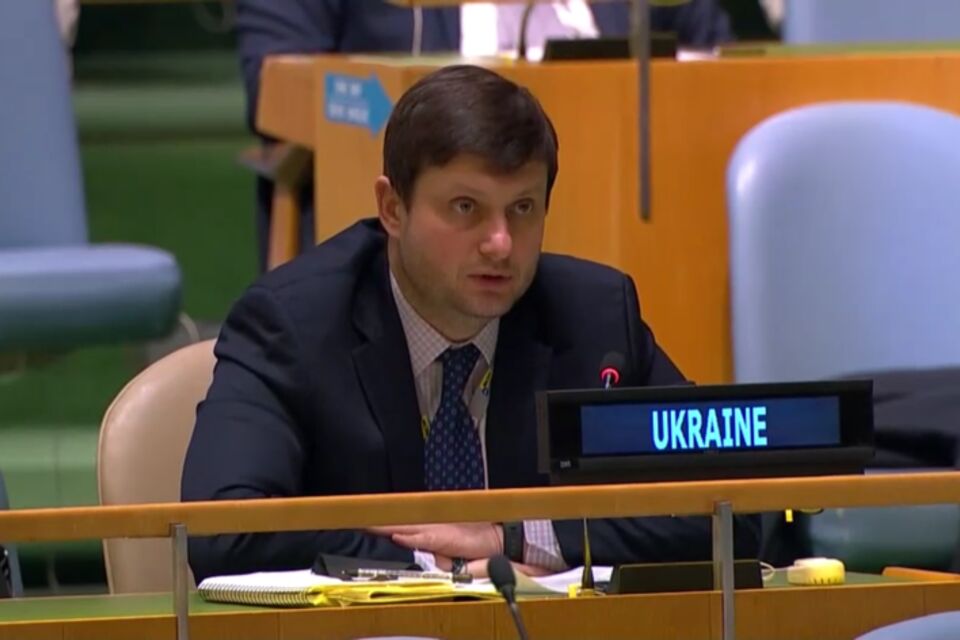Statement by the delegation of Ukraine in explanation of vote after the action on draft resolution A/75/L.64 Cooperation between the United Nations and the Council of Europe

Mr. President,
I would like to express our gratitude to the delegations of Germany and Greece for facilitating preparation of the draft resolution just adopted.
The item on cooperation between the two organizations was included in the agenda of the General Assembly a little more than 20 years ago. We recall that during the first consideration it was stressed on the need to enhance cooperation between the two organizations, taking into account the contribution that the Council had made to the UN, particularly in promoting the rule of law and the protection of human rights and democratic values.
It is still true: both the United Nations and the Council of Europe placed human dignity at the core of their missions and mandates. Stronger working links between them in this sphere could only aid in the achievement of their noble cause.
For instance, the European Convention on Human Rights provided for the possibility of recourse to the European Court of Human Rights, whose judgements are of a legally binding character. Here, we welcome the Decision dated 14 January 2021 of the Court, which ruled on the admissibility of an interstate claims in Ukraine's case against the Russian Federation.
It is important to note that the Court considered as part of the relevant legal framework UNGA Resolutions on the territorial integrity of Ukraine as well as on the situation of human rights in the Autonomous Republic of Crimea and the city of Sevastopol (Ukraine). This Decision clearly demonstrates how relevant are the values and aims of the two organizations.
At the same time, I would like to underline that the Council has also made the abolishment of capital punishment as one of the two principal conditions for the membership, striving to make it a universal value. Therefore, it is regrettable that this value, as fully accepted by 47 Council’s members constituting almost 25% of the UN membership, is still excluded from the resolution we just adopted.
Mr. President,
The Council has a significant capability in conflict prevention, which lay in a combination of standard-setting, cooperation and monitoring at both legal and political levels. Yet, it is unacceptable when one can hear in the Council that it is the United Nations which should deal with armed conflicts while the Council should continue its work on human rights. As if one can work on human rights in isolation from conflicts resolution.
It is a wrong logic. I reiterate that peace and security and human rights are interrelated issues. Gross human rights violations and intolerance lead only to conflicts and fuel wars.
Therefore, Ukraine expects the Council of Europe to pay due attention to the violations of human rights, committed by the Russian Federation in Donbas and in illegally occupied Crimea. We will continue to demand that the Russian Federation provides conventional and institutional monitoring mechanisms of the Council of Europe and other international organisations with unimpeded access to the temporarily occupied territories of Ukraine.
We are confident that the Council of Europe has necessary expertise and potential to conduct monitoring there – either on the ground or at the distance. The only missing component to launch this process is respective political will.
Mr. President,
Today we adopted by consensus a framework resolution on the cooperation between the United Nations and Council of Europe. It was supported including by those who is continuously blackmailing both organizations. Some consider that it is worth listening to the UN General Assembly and Council of Europe institutions as long as there is no attempt to stop their criminal actions against their own people or neighbouring peaceful countries.
When it comes to uncovering such illegal actions, it is stated that the authority of the General Assembly is under attack as it was done by the Russian representative during the consideration of Russian aggression against my country in the UNGA on February 23. Or is it was recently stated by the Russian Ombudsperson in the rank of General-Major of Police regarding human rights defenders and institutions of the Council of Europe: “Whether we are in the Council of Europe or not, the temperature of confrontation will rise. The stronger Russia is the more intense this struggle will be”.
Ukraine remains deeply concerned over the concession by the Parliamentary Assembly of the Council of Europe with respect to the Russian Federation allowing its delegation to return to the Assembly. This step has been taken while Russia continued its armed aggression against my country and was deliberately refusing to comply with the relevant PACE and UN resolutions adopted in response to that aggression.
I would like to refer to the statement of the Federal Minister for Foreign Affairs of Germany Heiko Maas who as the Chair of the Committee of Ministers of the Counil of Europe underlined that “peaceful and tolerant Europe cannot be taken for granted. Democracy, the rule of law and human rights are under pressure.”
I hope that when we come back to the draft resolution of the UN-CoE cooperation in two years we can open the dedicated web-page of the two organizations, which will be reach of information on practical interaction and cooperation between them including in the sphere of peace and security
I thank you.
